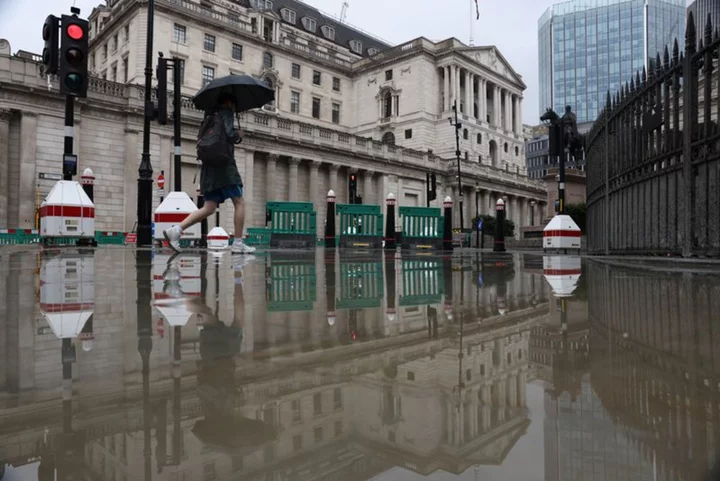By David Milliken
LONDON The Bank of England is expected to raise interest rates to a 15-year high of 5.25% from 5% on Thursday, though there is a risk of a repeat of June's surprise half-point increase as inflation remains the highest of the world's major economies.
The U.S. Federal Reserve and the European Central Bank increased rates by a quarter of a percentage point last week, but unlike the BoE, markets think they are at or near the end of their rate-tightening cycle.
Bets on how high the BoE will go have swung in recent weeks as investors try to work out if Britain has a uniquely deep-rooted inflation problem.
Market expectations for peak Bank Rate reached 6.5% on July 11 after data showed record wage growth before falling back to 5.75% after a sharp decline in consumer price inflation.
But at 7.9% in June, annual price growth is nearly four times the BoE's 2% target and more than double the U.S. rate.
Prime Minister Rishi Sunak pledged in January to halve inflation this year, a goal which now looks challenging.
Mortgage costs have hit their highest since 2008, weighing on house-building. A survey last week showed private-sector growth across the economy fell to a six-month low in July.
Investors see a two-in-three chance of the BoE raising Bank Rate to 5.25% on Thursday but for most economists polled by Reuters the BoE's decision is finely balanced.
ING economist James Smith said the BoE was "doing a bit of soul-searching" after missing last year's inflation surge.
"That's partly why all the central banks are erring on the side of over-tightening rather than under-, because they don't want to be the ones remembered for inflation staying high on their watch," Smith said.
The BoE began raising rates in December 2021, before other major central banks. A hike on Thursday would be its 14th in a row.
SEEING THE JOB THROUGH
Governor Andrew Bailey has said it is "crucial we see the job through". Deputy Governor Dave Ramsden said even after recent falls, inflation remained "much too high" and there had not been much softening in longer-term pressures.
The picture from Britain's job market is mixed. Wage growth excluding bonuses held at an annual rate of 7.3% in the three months to May, the joint highest since records began in 2001. However, unemployment rose unexpectedly to a 16-month high of 4%, and employers advertised fewer job vacancies.
Swati Dhingra is likely to be the only Monetary Policy Committee member to vote for a pause in rate hikes, pointing to weak producer price inflation which fell to 0.1% in June, its lowest since December 2020 and down from nearly 20% last July.
Silvana Tenreyro, who also voted to keep rates on hold this year, has been replaced by former Kroll Institute chief economist Megan Greene, who has said it would be "a mistake" to assume inflation would automatically return to target.
However, some BoE critics argue it risks causing an unnecessary downturn, and that higher rates are a poor tool to tackle inflation caused by higher food and energy prices.
"The main winners are banks, whose profits have flourished thanks to higher rates," said Fran Boait, co-executive director of campaign group Positive Money.
The BoE is likely to lower its growth and inflation forecasts due to higher market interest rate expectations, an important part of the forecasts.
Last week the International Monetary Fund forecast Britain's economy would grow 0.4% this year - the second slowest in the Group of Seven advanced economies, after Germany.
Normally, how far the BoE's forecast for inflation in two years' time deviates from its 2% target is read as a signal of how much it agrees with market rate bets.
However, in recent months the BoE has focused more on the risks of persistent inflation.
"I think we'll get the same forward guidance, which is vague enough to keep their options open," ING's Smith said.
(Reporting by David Milliken; editing by William Schomberg and Giles Elgood)

